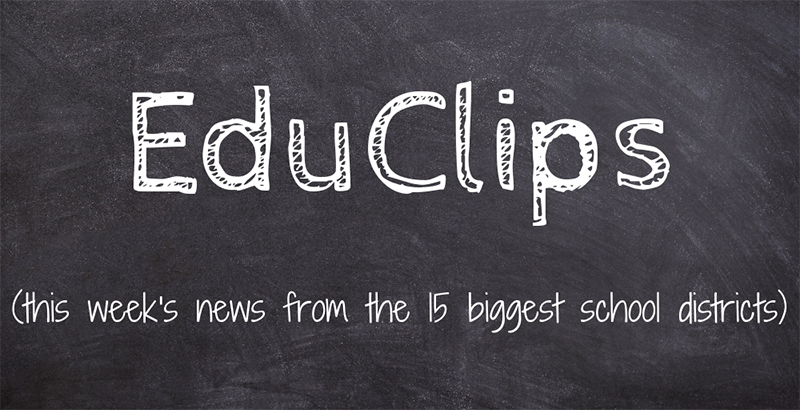EduClips: From Florida Schools Welcoming Displaced Bahamian Students to a Federal Push to Ban Flavored E-Cigarettes, Education News You Missed This Week From America’s 15 Top Districts

EduClips is a roundup of the week’s top education headlines from America’s 15 largest school districts, where more than 4 million students across 10 states attend class every day. Read previous EduClips installments here.
NATIONAL: FDA to Ban Flavored E-Cigarettes to Combat Youth Vaping — President Donald Trump announced Wednesday that his administration plans to ban the sale of flavored e-cigarettes because of the dangers they pose, especially to young people who are drawn to the flavors. “We intend to clear the market of flavored e-cigarettes to reverse the deeply concerning epidemic of youth e-cigarette use that is impacting children, families, schools and communities,” Health and Human Services Secretary Alex Azar said in a statement. “We will not stand idly by as these products become an on-ramp to combustible cigarettes or nicotine addiction for a generation of youth.” E-cigarettes are thought to be a cause of a mysterious lung illness that’s caused six deaths and hundreds of hospitalizations this year. Vaping, which e-cigarette companies bill as a safer alternative to traditional cigarettes, has surged among middle and high school students in recent years. (Read at NPR)
PALM BEACH: Florida Schools Welcome Bahamian Students Following Hurricane Dorian — Florida’s Palm Beach schools are welcoming Bahamian students displaced by Hurricane Dorian. The district has partnered with a local nonprofit to make sure students have the supplies they need for school. So far at least six students have enrolled, and officials aren’t sure how many to expect. “They need to get back to something safe, they need to be around kids their age, a teacher,” Keith Oswald, the deputy superintendent of Palm Beach County Schools, told CBS 12. At least one private school is preparing for students from the Bahamas as well and offering them free tuition, Florida Today reported. (Read at CBS 12)
CHICAGO: District Agrees to Federal Oversight of Sexual Violence Protections for Students — The federal Office for Civil Rights will hold Chicago Public Schools accountable for reforming how it handles abuse and assault cases in what officials called a “historic enforcement action,” the Chicago Tribune reports. Announced Thursday, the legally binding agreement outlines changes CPS must make to protect students from sexual assault and abuse. Federal officials will monitor the district for three years, and CPS could lose some federal funding if it does not comply with the reforms. “This is an extraordinary and appalling case,” Assistant Secretary for Civil Rights Kenneth Marcus said. “It is one of the worst that we have seen in the elementary, secondary school context.” The agreement follows an investigation into the city’s schools that started in 2015 and intensified after a 2018 Chicago Tribune series detailing several cases of abuse in the city’s schools. “The failures of Chicago Public Schools were widespread, glaring and heartbreaking,” Education Secretary Betsy DeVos said in a statement to the Tribune Thursday. (Read at the Chicago Tribune)
CALIFORNIA: Teachers Could Get Paid Maternity Leave If Governor Agrees — A bill awaiting Gov. Gavin Newsom’s signature would provide teachers and select other school employees six weeks of fully paid maternity leave. “Currently, teachers can take unpaid maternity leave, but most use vacation and sick leave in order to get paid. After their sick leave is used up they can earn differential pay — the remainder of their salary after the district pays for a substitute for their class — for up to five months while on maternity leave,” EdSource reported. Supporters of the bill say the lack of maternity leave is one reason districts have trouble attracting teachers. Critics point out that the policy, which would apply to district and charter schools as well as community colleges, would be expensive, and many school systems already have tight budgets. (Read at EdSource)
FLORIDA: State Lawmakers Decided to Let Teachers Carry Guns, but Most Won’t — A month after the 2018 school shooting in Parkland, Florida, the state passed a law allowing non-teaching school staff members to carry guns if they get background checks and training; this year that law was expanded to include teachers as well, if county boards vote in favor. But few districts have signed on to the program, a new analysis from The Wall Street Journal shows. Just seven of the state’s 67 county districts have adopted policies allowing armed staff. None of the state’s 25 largest districts will allow teachers to be armed. Most of the districts participating in the program are in rural areas. Broward County, where the shooting occurred, will not allow armed staff. The program was created at the recommendation of the state safety commission created after the shooting. (Read at The Wall Street Journal)
Noteworthy Essays & Reflections
EDLECTION 2020 — Analysis: 10 K-12 Education Policy Questions Every Presidential Candidate Should Answer (Read at Center for American Progress)
TEACHER VOICE — I’ve Seen My Students Win a Star Scholarship — and Lose Their Way. Chicago Should Rethink the Program. (Read at Chalkbeat Chicago)
RESEARCH — Teaching Critical Thinking Might Be a Waste of Time (Read at The Hechinger Report)
STUDENT HEALTH — Ban Flavored E-Cigarettes to Protect Our Children (Read at The New York Times)
PARENTING — We Interviewed 100 Teachers About What It Takes to Raise Happy, Successful Kids. Here Are the Highlights (Read at Philadelphia Magazine)
Quotes of the Week
“We can’t allow people to get sick and we can’t allow our youth to be so affected.” —President Donald Trump, announcing plans by the Food and Drug Administration to rein in sales of flavored e-cigarette products. (Read at Education Week)
“They’re a player. When they’re making decisions, normal politicians or bureaucrats are usually thinking, ‘What’s my community going to say? What are the teachers unions going to say? What are the politicians going to say?’ And if you think about a relatively small group of students, that would not normally be a big part of that discussion.” —Boston Globe reporter Dan McGowan, on the success of the Providence Student Union. (Read at The74Million.org)
“I was teaching sophomores about my experience as a sophomore, and I would go home after that lesson and just break down. I was having a hard time detaching. [Teachers] want to form a connection, but we also need to stay professional as historians and have that little bit of detachment. It’s definitely not easy to do.” —Teacher Lauren Hetrick, herself a student on September 11, 2001, on educating students about the terrorist attacks. (Read at Time)
“The idea of more preschool for more kids is noble, and it’s the right thing, but somewhere between the concept and the rollout, something has gone wrong.” —Mario Perez, the executive director of El Hogar Del Nino, a Chicago child care center, on plans to redistribute $200 million in early learning funds. (Read at Chalkbeat)
“The conversation in this city should be about how do we educate all of our kids in the most effective manner and that the ultimate measure of fairness is that every child is getting just as good an education regardless of where they live.” —New York City Mayor (and Democratic presidential candidate) Bill de Blasio. (Read at The74Million.org)
Get stories like these delivered straight to your inbox. Sign up for The 74 Newsletter

;)
